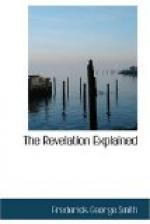17. For God hath put
in their hearts to fulfil his will, and to
agree, and give their kingdom
unto the beast, until the words of
God shall be fulfilled.
18. And the woman which
thou sawest is that great city, which
reigneth over the kings of
the earth.
The special thoughts contained in these verses have been so far explained already that it is unnecessary to go over the same ground again. Already the civil powers of Europe are beginning to cast this woman aside as an old, wrinkled, haggard prostitute is cast off by her lovers. Already they have deprived her of all temporal authority such as she possessed in guiding this beast of chapter 17, as explained under the fifth plague in the preceding chapter. Whether they are destined to become a still greater enemy to her, the future will determine.
CHAPTER XVIII.
And after these things I saw
another angel come down from
heaven, having great power;
and the earth was lightened with his
glory.
2. And he cried mightily with a strong voice, saying, Babylon the great is fallen, is fallen, and is become the habitation of devils, and the hold of every foul spirit, and a cage of every unclean and hateful bird.
3. For all nations have drunk of the wine of the wrath of her fornication, and the kings of the earth have committed fornication with her, and the merchants of the earth are waxed rich through the abundance of her delicacies.
A movement of mighty power is symbolized in these verses. The chronology of the events described in the preceding chapter brings us down to the time when the ten horns turn against the Papacy by depriving her of her temporal authority. This, as we have already seen, was completely fulfilled in 1870 and constituted the fifth plague. In the description of the sixth plague which followed, it was shown that the great city which was invaded was composed of three parts—Paganism (the modern form of the dragon power), Catholicism, and Protestantism. The same great city is here brought to view, and the angel from heaven, with a mighty voice, cries, “Babylon the Great is fallen, is fallen.” This fall of Babylon can not signify a literal destruction; for there are certain events to take place in Babylon after her fall which entirely precludes that idea; for instance, the calling of God’s people out of her, in order that they may not receive of her plagues. In these plagues is embraced her literal destruction, or complete overthrow. The fall is therefore a moral one; for the result of it is that Babylon becomes “the habitation of devils, and the hold of every foul spirit, and a cage of every unclean and hateful bird.”




